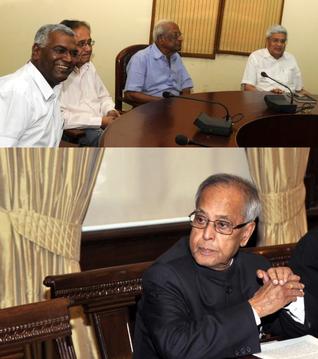 New Delhi, May 5: Left parties on Friday decided to watch the unfolding scenario before finalising their stand on the presidential election, even as sources in the Nationalist Congress Party (NCP) indicated that the party preferred Union Finance Minister Pranab Mukherjee to Vice-President Hamid Ansari.
New Delhi, May 5: Left parties on Friday decided to watch the unfolding scenario before finalising their stand on the presidential election, even as sources in the Nationalist Congress Party (NCP) indicated that the party preferred Union Finance Minister Pranab Mukherjee to Vice-President Hamid Ansari.
Leaders of the Communist Party of India (Marxist), the Communist Party of India, the All-India Forward Bloc and the Revolutionary Socialist Party met here for informal discussions and decided to initiate consultations with secular parties in the Opposition before taking a stand.
“The Left parties held a preliminary discussion on the… presidential election. It would be better if there is a wide agreement on a candidate… The Left parties decided to consult… other secular Opposition parties before taking a final stand…,” a joint statement said.
The meeting came hours after CPI(M) general secretary Prakash Karat met Samajwadi Party president Mulayam Singh. The latter met Trinamool Congress chief Mamata Banerjee on Thursday.
“The bottom line is everybody has decided to wait and watch,” a senior Left leader told The Hindu. The four parties decided to meet again later this month. After discussions among themselves and outside, it was concluded that it would be better to wait for the Congress to come up with a proposal.
General secretaries of the Left parties Prakash Karat, S. Sudhakar Reddy, Debabrata Biswas and T.J. Chandrachoodan, and senior leaders A.B. Bardhan, Sitaram Yechury, S. Ramachandran Pillai and D. Raja attended the meeting.
Informed sources said while Mr. Mulayam Singh indicated that no names were suggested to him by the Congress, Ms. Banerjee told him that while consultations should continue, it was too early to take up individual names for consideration.
After the meeting, Mr. Bardhan told journalists, “We have not zeroed in on any name… Do not try to impose any name on me,” he said, when asked whether the Left parties would back Mr. Mukherjee.
Besides the Samajwadi Party, the sources said, the Left parties decided to consult the Biju Janata Dal, the Telugu Desam Party and the Janata Dal (Secular).
BJD leader and MP Bharatruhari Mahtab said while the party was discussing the issue with its MPs, it would take a formal view only after the Congress proposed a name. “Time has not yet come to take a firm view.”
A senior NCP leader said both the UPA and the NDA did not have the numbers to get their choice of candidates elected and would have to depend on allies.
The party believed that the former President, A.P.J. Abdul Kalam, and other non-political candidates were out of the contention.






Comments
Add new comment